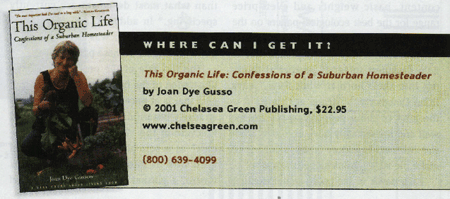This Organic Life: Confessions of a Suburban Homesteader
Reviewed by Richard Walthers

It has often been said that stories are the best teachers. Joan Dye Gussow’s recent book, This Organic Life, Confessions of a Suburban Homesteader, is a deceptively simple story of one woman’s passion for gardening. The author is a respected writer and speaker on nutrition and health, and she is revealed to be a gifted story-teller and teacher as well.
Her saga begins as she and her husband decide to move out of the large Victorian house that they have lived in for the last 36 years. And as a result of her fiery speeches about problems in the food system they also decide to put theory into practice and be as self sufficient as possible by growing most of their own food. They want to liberate themselves from the usual food production and distribution channels.
So they plan to leave a house that is too big and a garden that is never quite big enough and that is also increasingly in the shadows of a number of large mature trees and shrubs. It is their search for more sunlight that leads them to a small parcel of suburban land on the banks of the Hudson River, that also contains a 150 year old Odd Fellows Hall that they think can be renovated into their last home.
It is in the telling of this story amid the discussions of vegetable varieties, gardening techniques and recipes that the author’s thesis reveals itself. Eat locally; the global environmental damage will be much less and it will be healthier for you. What Gussow calls her most abstract and uncomfortable reason for trying to eat locally is her profound concern for the future of the planet.
She reminds us that it is not Kraft, General Mills, or Kelloggs or any of the other myriad of supermarket brands that provide us with our daily foodstuffs. Rather it is our sole dependence on growing plants and our relationship with the food-producing ecology of nature that gives us our sustenance. When speaking at a recent conference, Gussow said there were two reasons why people didn’t eat locally. First they didn’t know why they should do it and secondly and most important – they didn’t want to know.
From an environmental perspective the idea of eating locally is imperative. As the author points out, most fruit and vegetables sold in the U.S. come from California. She wants us to calculate the true cost of this fruit – for instance it takes 435 fossil fuel calories to fly a 5 calorie strawberry from California to New York.
Throughout the book she pleads for consumers to support their local farmers. Local farmers cannot compete with the subsidized water that California farmers enjoy. At the present time, organically grown food represents only about 2% of the total retail food market, but during the last several years it has had a 20% growth rate. Next year the long fought over national standards for organic foods will be in place and they are expected to prompt even greater gains for the organic food markets.
The cyclical systems approach that is inherent in organic farming techniques not only results in wholesome, chemical free, non-genetically altered food but it also promotes biodiversity, clean water, and energy and soil conservation in the typically Leopoldian stewardship concept of useful and appropriate land management.
This book should engage the larger debate about our dated agricultural policies. Future farm subsidies which are presently in the tens of billions of dollars range should be given to farmers who are attempting to accomplish some of these organic farming goals. They should be getting payments for not growing crops in the old petro-chemically intensive manner. We should be rewarding good farming practices and penalizing bad ones.
A backyard gardener somewhere once said "the only things money can’t buy are love and home grown tomatoes". Well, you can buy this book, and it is written with so much love that you can almost taste the home grown tomatoes. It’s like an unexpected letter from a good friend that you haven’t seen or heard from for a long time and every word is cherished because each one carries with it the personality of the writer, all the common experiences, and the wisdom gained through aging.
I must admit to a personal bias. I am an organic gardener and have maintained a garden every year for more decades than I care to admit. I realize that not everyone likes to garden, and even fewer people probably understand the need to provide food locally. But this book is a pleasure to read. It doesn’t preach, but it is insistent. The story is so genuine and heartfelt that the truth of its message is undeniable.
Traditional native people in this country believe that there is no truth, just stories. This is a terrific story that answers the constant question "But what can I do? I’m just one person." Start a garden - the impact will reach far beyond your kitchen table. Our connections to nature come into focus when gardening and the environmental choices we face automatically become clearer when growing our own food.